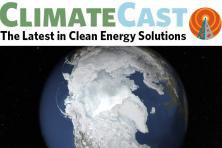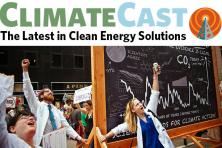From how we heat our homes to how we power our cars, renewables are replacing coal
The future is coal-free. More coal-fired power plants have been closed in Trump's first two years in office then during Obama's entire first term. America’s number three coal state, Pennsylvania, just issued its own aggressive greenhouse gas reduction targets. Outside the U.S., renewables have officially overtaken coal as Germany’s main energy source for the first time. Meanwhile, 2018 was a great year for electric vehicles in the U.S.; sales increased by 81 percent from 2017. Clean sources of electricity, or course, mean a lower carbon footprint for electric vehicles. But new research confirms that even EVs powered by coal are cleaner than traditional gasoline vehicles.
Fired up for clean energy in the Pacific Northwest
Today kicks off Oregon’s 2019 legislative session. On the agenda: a Clean Energy Jobs bill to cap and price climate pollution from the largest emitters in the state. Proceeds from the price on carbon would be reinvested into helping Oregon transition to a clean energy economy. Supporters are optimistic about the bill’s prospects, but roadblocks still lay ahead as industry influencers seek to weaken the legislation. A new analysis from Energy Innovation finds that Clean Energy Jobs promises to vault Oregon to the forefront of US climate leadership. In her state-of-the-state address, Governor Brown stated she intends to sign the Clean Energy Jobs bill into law.
Climate action also made headlines in Washington State, as Governor Inslee highlighted climate change as his top issue in his state-of-the-state address. During the legislative session that began last week, lawmakers are considering a bill to implement a Clean Fuels Standard, similar to laws already on the books in Oregon and California. House Bill 1110 would reduce carbon pollution from transportation to 10 percent below 2017 levels, and continue to reduce emissions to 20 percent below 2017 levels by 2035. A bill calling for 100% clean electricity would require the state to banish coal entirely from its electricity grid by 2025 and set a 2045 deadline to move the state’s electric grid to renewable energy sources. It would also establish strict emissions goals to discourage the building of new fracked gas plants. Considering that statewide emissions actually increased by 6 percent in recent years, it’s encouraging to see state leadership prioritizing climate action.
In short, it should be an exciting year for legislative climate action in the Pacific Northwest. Climate Solutions’ Executive Director Gregg Small makes the case for why our states are well positioned to win on climate this year.
Government Shutdown
The far-reaching effects of the current federal government shutdown are revealing themselves week by week. Now we must add to the list increasing the threat of wildfires. This is the time of year when federal agencies hire and train firefighters for wildfire season. Wildfire prevention work also begins in the winter. Oregon Senators Ron Wyden and Jeff Merkley wrote President Trump a letter urging him to reopen the government so that federal forestry professionals and firefighters could continue this important work. The shutdown is also hampering access to important climate and weather data; NASA and the National Oceanic and Atmospheric Administration have been unable to issue their annual temperature analyses. Because this data is so widely used, some other governments that incorporate U.S. data into their own reports have been unable to release their findings. The problem hit home recently when local Portland ABC affiliate, KATU’s Chief Meteorologist, Dave Salesky, wrote about being unable to access data that is integral to his forecasts -- particularly when it comes to issuing winter weather advisories.
The Trump administration is using the shutdown to help further its energy agenda. The Interior Department’s Bureau of Offshore Energy Management (BOEM) mandated that 40 workers be brought in for offshore drilling during the shutdown -- in addition to the 84 workers that are already there. It’s a surprising mandate, considering that most other federal employees working during the shutdown have jobs that pertain to the “protection for life and property.”
Impacts: red flags everywhere
It’s a world of climate impacts out there, but as one weeds through the stories, it’s clear that they are increasing in severity and have global implications. Several new studies show that the world’s oceans are warming much faster than previously thought, fueling storms and contributing to sea level rise. Researchers have also found that this warming is projected to continue at a rapid rate, warming up to six times more between 2081–2100 than the total ocean warming recorded over the past 60 years. The influx of warm ocean water is causing Antarctic glaciers to melt at an accelerating pace. According to new research, ice loss from Antarctica has sextupled since the 1970s. But that’s not all that’s melting. New data shows that permafrost regions around the world have warmed by a half degree Fahrenheit between 2007 and 2016. In the Siberian Arctic, permafrost temperatures have increased by as much as 1.6 degrees Fahrenheit. A new analysis predicts climate change could "halt and reverse" progress made in human health over the last century, killing at least 250,000 people annually as climate change increases deadly incidents of malaria, diarrhea, heat stress and malnutrition.
Climate costs
The U.S. led the world in climate catastrophes in 2018, with the Camp Fire being the most costly climate disaster worldwide. (The average cost of each major U.S. climate disaster in 2018 was $16.5 billion.) California utility PG&E Corp is even looking into whether to file for bankruptcy protection because of the billions of dollars in liabilities it faces because of its role in the wildfires. On the Atlantic coast, sea level rise is wreaking havoc on Florida septic tanks, impacting not only the homeowners they belong to, but local water supply and public health. A new study shows that by 2040, 64 percent of Miami-Dade County septic tanks (more than 67,000) could have issues every year.
Bad decisions and backwards maneuvers
A new economic study shows that U.S. carbon emissions rose by 3.4 percent last year. This might seem like a small percentage, but it’s actually the biggest jump since the bounce back from the recession in 2010, and the second largest gain in over two decades. A new report reveals that the U.S. is ramping up oil and gas drilling faster than any other country in the world, and is looking to add the equivalent of 1,000 coal plants’ worth of planet-warming gases by 2050. At this rate, by 2030, the U.S. is on track to produce 60 percent of the world’s new oil and gas supply. Thankfully, there are voices of sanity amidst the madness—and many of them are coming from the Pacific Northwest. Oregon Senator Ron Wyden is urging Congress to kick its carbon habit and embrace the concept of a “Green New Deal.” And Washington Governor Jay Inslee is making the case that the next President must make climate action their top priority.
In Brief: New Washington Map shows why environmental health is a justice issue
A new, online, interactive map of Washington state—the Washington Environmental Health Disparities Map—allows people to see how their communities rank for environmental-health hazards like diesel emissions, potential lead exposure and proximity to toxic waste. Developed by Front and Centered in collaboration with researchers at the University of Washington, the map also breaks down socioeconomic characteristics and overlays the information with environmental data to reveal which communities are most and least at risk for certain environmental health issues.





